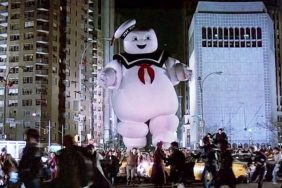Hasbro Studios makes films about Hasbro toys. That shouldn’t astound anyone. And it should come as no surprise either that their first wave of movies – Transformers, G.I. Joe and Battleship – were all about how those toys were AWESOME. Because robots blowing up other robots and heroic military guys blowing up other military guys (and also aliens) are AWESOME. The only appropriate response to these films – besides, perhaps, a dissatisfied shrug – is a low, guttural “YEAAAAAH” followed by a high-five and shotgunning a Budweiser.
So when the time came to make a movie about another Hasbro product, the Ouija board that supposedly lets the players contact the dead, Hasbro probably could have got away with that same approach. Teenagers sit in a circle, commune with the afterlife and set about a series of fantastical misadventures with comic relief ghosts and cartoonishly evil demons. It writes itself, really, and it probably would have sold a whole hell of a lot of Ouija boards.
Instead, Hasbro went in another direction. They have spent millions of dollars telling their potential customers that Ouija boards are unholy conduits to the other side that will only get attractive teenagers killed. I guess that’s okay if you’re not an attractive teenager, but it’s an unusually roundabout way to market a product. It would be like if Marlboro posted billboards all over America featuring just the Surgeon General’s warning and the words “WE DARE YOU.”

The plot is about a young woman named Debbie (Shelly Hennig) who dies under mysterious circumstances after using a Ouija board. Her best friend Laine (Olivia Cooke) convinces her sister Sarah (Ana Coto) and friends Trevor (Daren Kagasoff), Pete (Douglas Smith) and Isabelle (Bianca Santos) into using that same Ouija board to get in touch with Debbie’s ghost, and wouldn’t you know it? It works. Then they all start dying.
There are worse premises for a horror movie. And infinitely better premises, but let’s not be a dick about it.
First-time director Stiles White does his level best to class up the joint with spooky lighting and a measured pace that’s clearly intended to ratchet the tension and let the characters shine. Unfortunately, he’s working with anemic material that doesn’t benefit from a subtle approach. Olivia Cooke has a somewhat rich character, confronting death for the first time on all fronts and emoting believably throughout, but the rest of the cast of Ouija flounders in stock stereotypes and exposition-laden dialogue that only makes the movie’s serious tone feel out of place. These are “fun” characters stuck in an earnest movie, an alchemical mixture that produces anything but gold.

What this movie is missing is – and I can’t believe I have to explain this to the makers of a PG-13 horror movie – adolescent fun. The situations in Ouija are so dour that they suck the life out of everyone and everything, including the audience. A few of the shock scares do their job but there’s no sense of excitement or ingenuity. These aren’t characters who stumble into danger by living too hard, they walk directly into it out of sheer misery. There’s no sense of what a tragedy it is when most of them die. Inevitability rolls over this horror movie like a gloomy cloud. It takes more complicated material than Ouija to terrify an audience without the unexpected in its arsenal.
The actual plot of Ouija takes a few clever turns, and Ana Coto has a really cute haircut. That’s about all I can say about a film that slouches through one formulaic scare after another, and contributes nothing noteworthy to the genre as a whole. As Ouija board movies go, Witchboard is a lot better, and Witchboard isn’t even all that good.
But in the end it seems a little unfair to even judge Ouija as a movie. The Transformers movies are a mess by any cinematic standard, but for the most part they are fun commercials. It’s a little evil that Hasbro makes you pay to see them, and sadly that’s the only true evil on display in Ouija too. They went in a new direction to market their products, and they failed. They didn’t make a fun commercial, and they didn’t disguise it as a good movie. They just told us that their product isn’t worth buying. And they made us buy a ticket to find that out.

William Bibbiani is the editor of CraveOnline’s Film Channel and the host of The B-Movies Podcast and The Blue Movies Podcast. Follow him on Twitter at @WilliamBibbiani.




